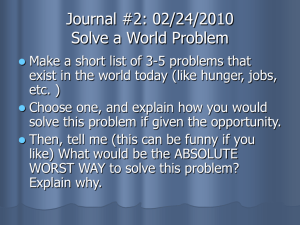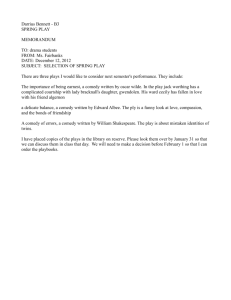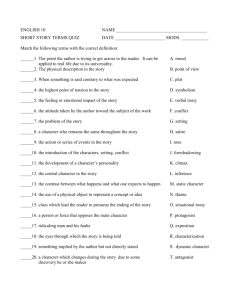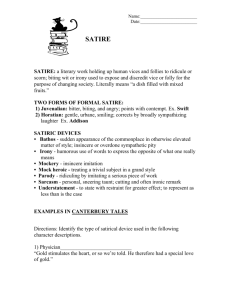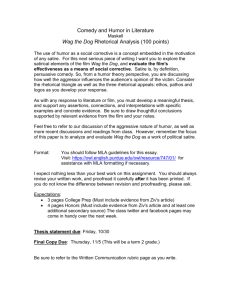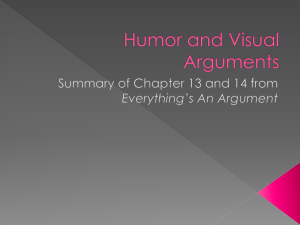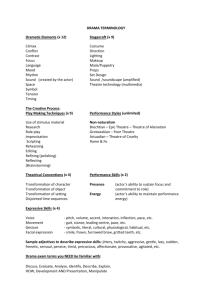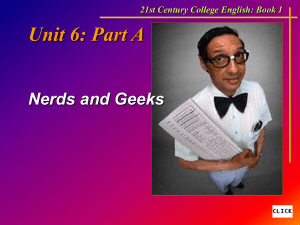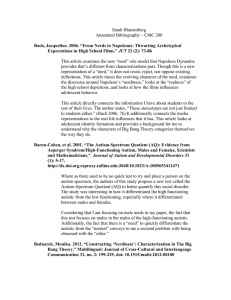Theatre 101 Notes to understand The Nerd Analyze this quote (1 – 4
advertisement
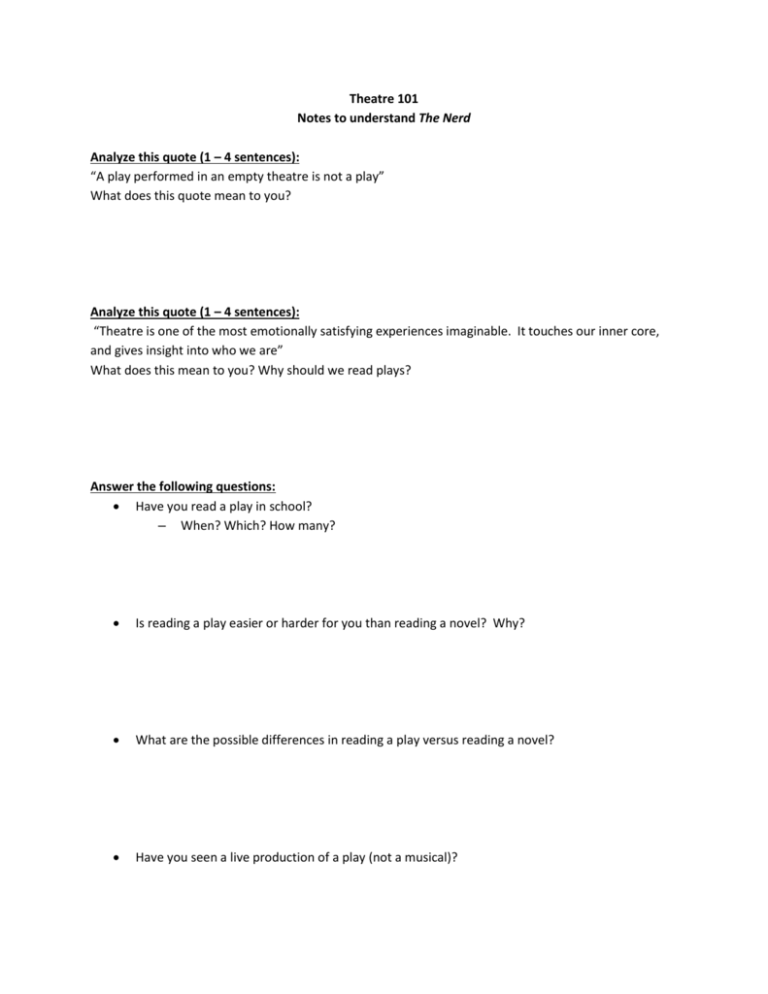
Theatre 101 Notes to understand The Nerd Analyze this quote (1 – 4 sentences): “A play performed in an empty theatre is not a play” What does this quote mean to you? Analyze this quote (1 – 4 sentences): “Theatre is one of the most emotionally satisfying experiences imaginable. It touches our inner core, and gives insight into who we are” What does this mean to you? Why should we read plays? Answer the following questions: Have you read a play in school? – When? Which? How many? Is reading a play easier or harder for you than reading a novel? Why? What are the possible differences in reading a play versus reading a novel? Have you seen a live production of a play (not a musical)? Stage Directions Usually found in _______________________________ and/or ___________________________ They give the actors and directors directions on how to ____________________ their role or _______________________ a scene. • __________________________________________ for character • _____________________________________ (where/when they move on stage) • __________________________________________ (basic activities like reading a newspaper) Sometimes written by the playwright Sometimes based on the first production – the choices the first director made. Stage Areas __________________________________: (______) A position approximately in the middle of the acting area. __________________________________: (_____) Right of center stage; the actor's right while facing the audience. __________________________________: (_____) Left of center stage; the actor's left while facing the audience. __________________________________: (_____) The half of the stage toward the rear wall, away from the audience. __________________________________: (_____) The half of the stage toward the audience. (TIP: stages were once “raked” or tilted, so the half closer to the audience was lower – this helped with being able to view the whole stage because the audience sections were flat, unlike today.) Body Positions Actors have 8 basic body positions on stage – 1. ___________________________________: The actor faces the audience fully. This is the ______________________________________ position. 2. ___________________________________: The actor stands with his full back to the audience. This position is used for brief periods of time for _____________________________________ effect. 3. ____________________________________(Right and Left): The actor stands facing right or left with profile in view of the audience. This is rarely a strong position, often used for __________________________ or ___________________________________effect. 4. ____________________________________(Right and Left): The actor stands in a quarter turn away from the audience, to the right or left. This position is used most often in ___________________________________________________plays. 5. ____________________________________(Right and Left): The actor stands in a three quarter turn away from the audience, to the right or left. This is the __________________________________________________ position. Other Terms • ____________________________________: the part of the stage which is visible to the audience. • ____________________________________: the part of the stage not visible to the audience and not enclosed by the setting. • ____________________________________ : the area behind the setting. • ____________________________________: the offstage areas to the right and left of the acting area. • ____________________________________ or ____________________________: usually the auditorium portion of the theatre including theatre seating. • _____________________________________________: hand that holds your prop (always your _____________________________________________ hand!! ) • *The DOWNSTAGE AREA is ____________________________________ than the UPSTAGE area!! • *STAGE RIGHT is _________________________________ than STAGE LEFT because the audience is conditioned to look from left to right. • _______________________________________________ – a set design with three basic walls, like a single room in a home; it gives the feeling of __________________________________ (3 walls of a square) • _________________________________________________ – the imaginary wall that exists between the audience and the actor to maintain the illusion of reality –that the audience is “peeking” in on the lives of the characters. • ________________________________THE FOURTH WALL – destroying the illusion of reality either by looking out to see/signal people in the audience. This is a NO-NO, unless intended by the playwright or director. Note: ____________________________________ do this all the time! • _____________________________________ -- a statement made by a character directly to the audience. These statements are “breaking the fourth wall,” and they shatter the illusion of reality, often for purposeful comic effect. • Example: Types of Stages • THREE MAIN TYPES • PROSCENIUM ARCH • • THREE-QUARTER • • Description: Description: ARENA (IN-THE-ROUND) • Description: Types of Irony • ___________________________ Irony: A play on words. If someone says something ironic, his words have a literal meaning and a shadowed meaning which only a select few understand, including the audience. Also known as_____________________________. • Irony: When the audience knows something that the characters do not know. • Irony: When the situation isn’t what someone would expect. (ex: a funeral in which the “deceased” is NOT deceased.) Types of Comedy • _______________________________________: Parody is defined as a work created to mock, comment on, or poke fun at an original work, its subject, or author, by means of humorous or satiric imitation. Parodies imitate or misrepresent somebody's style, in a humorous way. Parodies mock serious situations with sarcastic imitation. • • Examples: _______________________________________: Stronger than parody, satire makes use of witty language to convey insults or scorn. In satire, human or individual vices, follies, abuses, or shortcomings are held up to reprimand by means of ridicule, derision, irony, or other methods. Although satire is usually meant to be funny, the purpose of satire is not primarily humor, but an attack on something or some subject the author strongly disapproves of. • • Examples: _________________________________________: Slapstick humor is a boisterous form of comedy with chases, collisions and practical jokes where people just do silly things such as tripping, falling over, or embarrassing themselves just to make people laugh. • • Examples: __________________________________________: High comedy refers to a sophisticated comedy, often satirizing genteel society. • • Examples: __________________________________________: Black humor or dark comedy often refers to the juxtaposition of morbid and farcical elements to create a disturbing effect. Black comedy, is a sub-genre of comedy and satire where grave topics like death, rape, murder, marital affair, human annihilation or domestic violence are treated in a satirical manner • Examples: • _____________________________________: A comedy characterized by broad satire and improbable situations. A farce aims to entertain the audience by means of unlikely, improbable and extravagant situations; disguise and mistaken identity; verbal humor of varying degrees of sophistication. It can include sexual innuendo and word play, or a fast-paced plot whose speed usually increases, culminating in an ending that often involves an elaborate chase scene. Farce is also characterized by physical humor and the use of deliberate absurdity or nonsense. • Examples: Let’s get started with The Nerd: Analyze this quote (1 – 4 sentences): “...what they lack in physical strength they make up in brain power. Who writes all the best selling books? Nerds. Who directs the top grossing Hollywood movies? Nerds. Who creates the highly advanced technology that only they can understand but we all want to use? ...Nerds. And who are the people who run for the high office of the Presidency? No one but nerds!” Think: What does it mean in our society to be a “nerd”? Connect: List examples of famous “nerds” from TV, books or movies. Shoot for 4! Ethics: Is it okay to be a “nerd”? Why or why not? Connect: Do you consider yourself a “nerd” in any way? Why or why not
